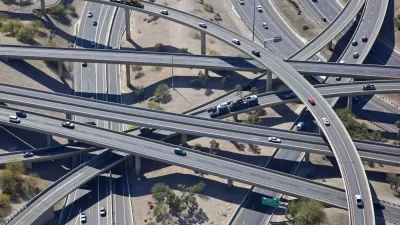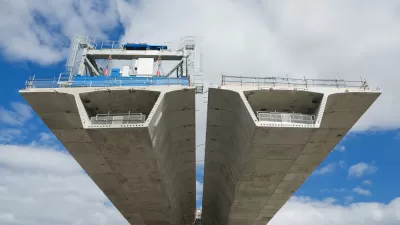A new analysis form the Pew Charitable Trusts showed a 20 percent reduction in state spending on transportation between 2002 and 2011, compared to a 4 percent drop from the federal government over the same period.
As written in Governing by Daniel Vock, a recent analysis on transportation funding throughout the last decade by the Pew Charitable Trusts illuminated the shifts in federal and state spending. While federal funding usually receives the brunt of criticism as an unreliable partner for funding, in fact, states are also to blame in their drop of transportation spending over the last decade.
As the report discusses, between 2007 and 2011, "average annual spending on highway and transit nationwide was $207 billion. Of that total, $82 billion, or 40 percent, came from states; $74 billion, or 36 percent, from localities; and $51 billion, or 25 percent, from the federal government."
According to the Vock, the federal government's average spending figures "are higher in part because it was still spending some $13 billion in stimulus money on transportation in 2011. Without the money from the recovery package, federal spending would have dropped by 25 percent between 2002 and 2011. The biggest reason for the spending drop at both levels was a decrease in buying power from fuel taxes."
The federal government relies on this fuel tax for maintaining and funding most of the country's transportation infrastructure, but expenditures have been outpacing revenues for the last decade. As Vock writes, "states are only in a slightly better position. They rely on vehicle taxes for a fifth of their road funding, but those revenues, too, have been falling. Pew suggested that declining vehicle ownership may be one reason those taxes dropped by $8 billion, or 21 percent, in the decade leading up to 2012."
Coupled with the decline in fuel tax revenues, "the cost of road construction increased by 60 percent between 2002 and 2012, meaning the dollars states and the federal government collected did not stretch as far."
FULL STORY: States Are Actually Driving Transportation Funding Declines

Planetizen Federal Action Tracker
A weekly monitor of how Trump’s orders and actions are impacting planners and planning in America.

Congressman Proposes Bill to Rename DC Metro “Trump Train”
The Make Autorail Great Again Act would withhold federal funding to the system until the Washington Metropolitan Area Transit Authority (WMATA), rebrands as the Washington Metropolitan Authority for Greater Access (WMAGA).

DARTSpace Platform Streamlines Dallas TOD Application Process
The Dallas transit agency hopes a shorter permitting timeline will boost transit-oriented development around rail stations.

LA County Creating Action Plan to Tackle Extreme Heat
Los Angeles County is creating a Heat Action Plan to help communities stay safe during extreme heat, with steps like adding more shade, improving buildings, and supporting the neighborhoods most at risk.

Maryland Plans Quick-Build Complete Streets Projects
The state will use low-cost interventions to improve road safety in five Maryland counties.

Downtown Los Angeles Gears Up for Growth
A new report highlights Downtown L.A.’s ongoing revival through major housing projects, adaptive reuse, hospitality growth, and preparations for global events in the years ahead.
Urban Design for Planners 1: Software Tools
This six-course series explores essential urban design concepts using open source software and equips planners with the tools they need to participate fully in the urban design process.
Planning for Universal Design
Learn the tools for implementing Universal Design in planning regulations.
City of Charlotte
Municipality of Princeton
Roanoke Valley-Alleghany Regional Commission
City of Camden Redevelopment Agency
City of Astoria
Transportation Research & Education Center (TREC) at Portland State University
US High Speed Rail Association
City of Camden Redevelopment Agency
Municipality of Princeton (NJ)




























